Lauren Groff & Ann Patchett charm audiences at Inprint reading
October 21, 2016, by Charlotte Wyatt
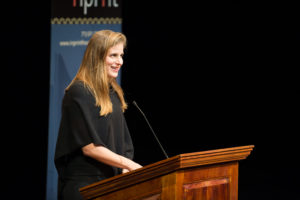 Last Monday night, the Inprint Margarett Root Brown Reading Series brought award-winning writers Lauren Groff and Ann Patchett to the Alley Theatre. Trying to find a seat in the sold-out crowd, I ran into a friend from my graduate program. We fell into a sudden and deep discussion about marriage, and what it means when only one rather than both members of a couple are able to pursue the career of their choice. How can you decide whose vocation will shape a family’s life?
Last Monday night, the Inprint Margarett Root Brown Reading Series brought award-winning writers Lauren Groff and Ann Patchett to the Alley Theatre. Trying to find a seat in the sold-out crowd, I ran into a friend from my graduate program. We fell into a sudden and deep discussion about marriage, and what it means when only one rather than both members of a couple are able to pursue the career of their choice. How can you decide whose vocation will shape a family’s life?
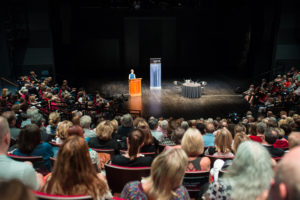 Both of the featured novels that night, Fates and Furies by Lauren Groff and Commonwealth by Ann Patchett, concern the consequences of marriage, either maintained or dissolved, and the discussion that followed revealed the depth with which both writers have entertained questions similar to our own.
Both of the featured novels that night, Fates and Furies by Lauren Groff and Commonwealth by Ann Patchett, concern the consequences of marriage, either maintained or dissolved, and the discussion that followed revealed the depth with which both writers have entertained questions similar to our own.
Groff introduced her reading by describing the composition of Fates and Furies, which examines a marriage from husband Lotto’s perspective before we hear from his wife Mathilde. As moments and phrases leapt to mind, Groff says she darted from her desk to record them on butcher paper hung from the wall, one for each character. Her startling language and sharp sense of the absurd was a perfect complement to Ann Patchett’s reading, which featured a large cast of Benadryl-tripping, gin-stealing, gun-toting kids whose families have been recombined by their parents’ changed relationships. In her selected passage, they mistake their longing to spend summer at a nearby lake as the source of their dislocation and sorrow.
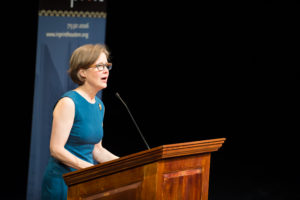 In the discussion that followed both readings—moderated with insight and humor by Amber Dermont, fiction writer and Associate Professor of English at Rice University—Patchett spoke of wanting to examine the reverberations of divorce in the lives of children, both growing up and grown. The conversation quickly turned to the interplay between relationships and art, and how the two together tend to produce inequity—most traditionally, in the masculine narrative of the artist and his muse. Groff compared her character Mathilde to a pressure cooker, a woman who understands how essential she is to her artist-husband’s success, but who is also aware of her constraints in that role. Both writers were quick to defend the complexity and uniqueness with which any individual must balance creative work with family, and the many invisible forces that shape success on the page and in life. Groff, a mother, acknowledged that someone (her husband) needed to be at home with the kids while she was working, especially on tour. Patchett, who is both a writer and book-store owner (Parnassus Books in Nashville, Tennessee), explained that she gladly cooks and irons for her husband daily. She also said the Catholic nuns who brought her up through primary school are the happiest people she knows—all of them women who have devoted their lives to serving—and she recognizes the impulse they instilled in her, to serve, as the best part of herself. But if she could fully get rid of it, she said, “I might be Tolstoy.”
In the discussion that followed both readings—moderated with insight and humor by Amber Dermont, fiction writer and Associate Professor of English at Rice University—Patchett spoke of wanting to examine the reverberations of divorce in the lives of children, both growing up and grown. The conversation quickly turned to the interplay between relationships and art, and how the two together tend to produce inequity—most traditionally, in the masculine narrative of the artist and his muse. Groff compared her character Mathilde to a pressure cooker, a woman who understands how essential she is to her artist-husband’s success, but who is also aware of her constraints in that role. Both writers were quick to defend the complexity and uniqueness with which any individual must balance creative work with family, and the many invisible forces that shape success on the page and in life. Groff, a mother, acknowledged that someone (her husband) needed to be at home with the kids while she was working, especially on tour. Patchett, who is both a writer and book-store owner (Parnassus Books in Nashville, Tennessee), explained that she gladly cooks and irons for her husband daily. She also said the Catholic nuns who brought her up through primary school are the happiest people she knows—all of them women who have devoted their lives to serving—and she recognizes the impulse they instilled in her, to serve, as the best part of herself. But if she could fully get rid of it, she said, “I might be Tolstoy.” 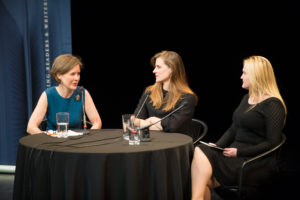
She recognizes the impulse they instilled in her, to serve, as the best part of herself. But if she could fully get rid of it, she said, “I might be Tolstoy.”
The line got a big laugh, and Dermont took it as an opportunity to address another balance writers must find, between their own work and engaging in the larger literary community. Patchett, whose reading Monday marked her third appearance with the Inprint series, spoke at length about the importance of maintaining the ecosystem in which readers, writers, publishers, and booksellers thrive. She encouraged the audience to attend other readings, purchase books locally, and then managed to both charm and admonish us into behaving efficiently in the book signing line. Both writers were kind and gracious to the many fans who waited to meet them, and by the time I finally made my way to the front of the line, the humor and energy evident in their readings was just as present at the signing table.
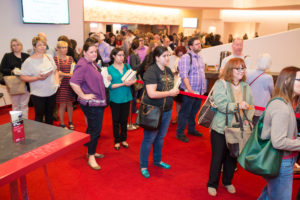 My friend and I didn’t get any answers to our questions, but as Groff put it to the audience, she doesn’t really write to find answers. She writes to find new questions, to delve more deeply into what drew us to ask in the first place.
My friend and I didn’t get any answers to our questions, but as Groff put it to the audience, she doesn’t really write to find answers. She writes to find new questions, to delve more deeply into what drew us to ask in the first place.
She writes to find new questions, to delve more deeply into what drew us to ask in the first place.
***********************
Inprint, in collaboration with Houston Public Media, presented a live stream of the reading. (Please note that the full video of the reading has temporarily been taken down to fix some of its technical glitches, we will repost it here and on the Inprint Archive of Readings once it is available.)
Lauren Groff’s latest novel is the New York Times bestseller Fates and Furies, a finalist for the National Book Award and the National Book Critics Circle Award, as well as a Best Book of 2015 selected by the Washington Post, Time, NPR, and others, as well as President Barack Obama’s favorite book of last year. Her other novels include the New York Times Notable Book Arcadia, and the Orange Prize for New Writers finalist The Monsters of Templeton. She has an acclaimed collection of short fiction, Delicate Edible Birds, and has received the Paul Bowles Prize for Fiction, the PEN/O. Henry Award, and a Pushcart Prize.
Ann Patchett was named one of Time magazine’s “100 Most Influential People in the World” in 2012, and her fiction has won the PEN/Faulkner Award and the Orange Prize, has been a finalist for the National Book Critics Circle Award, and named to a number of Best Books lists. Her novels include the New York Times bestseller Commonwealth, The Patron Saint of Liars, The Magician’s Assistant, Run, and State of Wonder, and the essay collection This Is the Story of a Happy Marriage as well as Truth and Beauty: A Friendship. She is co-owner of Parnassus Books in Nashville and a staunch advocate for independent bookstores

